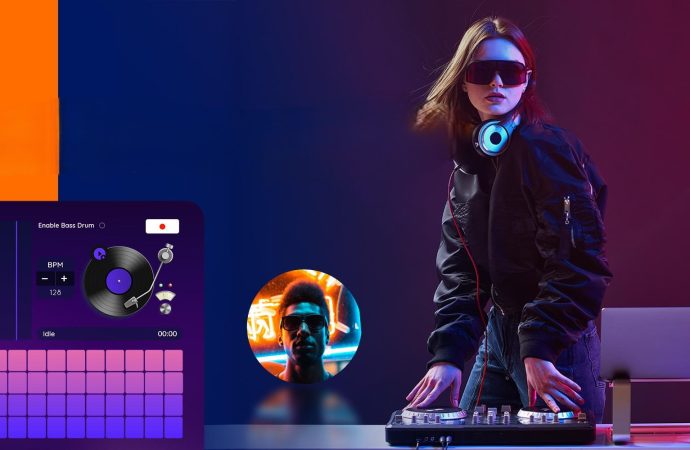Introduction Artificial intelligence (AI) has made groundbreaking advancements across various industries, and the music sector is no exception. The development of AI music generators has opened up new possibilities for both amateur musicians and seasoned artists, allowing them to create songs quickly, effortlessly, and with a high level of creativity. But what exactly is an
Introduction
Artificial intelligence (AI) has made groundbreaking advancements across various industries, and the music sector is no exception. The development of AI music generators has opened up new possibilities for both amateur musicians and seasoned artists, allowing them to create songs quickly, effortlessly, and with a high level of creativity. But what exactly is an AI music generator, and how does it work? In this article, we explore the features, benefits, and future potential of AI music generators.
What is an AI Music Generator?
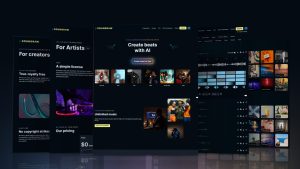
Image by: Yandex.com
An AI music generator is a software tool that uses artificial intelligence algorithms to compose, produce, and generate music. These systems analyze large datasets of music to understand patterns, structures, and styles. Then, using this knowledge, they create new pieces of music that mimic these patterns. Whether you’re an artist looking for inspiration or a producer needing background music, AI music generators offer an accessible way to create high-quality compositions.
Some AI music generators allow users to choose genres, tempos, and instruments, while others provide more advanced features, such as mixing and mastering capabilities. These tools are becoming increasingly popular for producing everything from ambient music to full-fledged songs.
How AI Music Generators Help Musicians
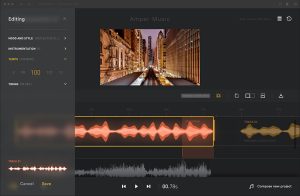
Image by: Yandex.com
AI music generators are becoming helpful tools for musicians. They can provide a quick starting point when artists are looking for inspiration. If a musician is stuck and doesn’t know where to start, the AI can suggest a melody or rhythm to build upon. This way, the artist can focus on the creative aspects, while the AI handles the basic structure. It’s like having a creative assistant that helps with the first draft of a song.
The Role of AI in Music Creation
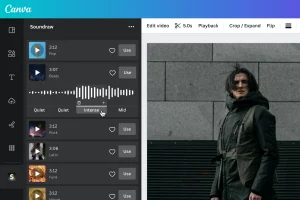
Image by: Yandex.com
AI plays an important role in how music is created today. It helps artists by generating melodies, harmonies, and rhythms based on patterns learned from existing music. AI music generators can also assist producers by offering royalty-free tracks that can be used in videos, games, or advertisements. These tools are becoming an essential part of the music-making process, providing new ways to create and experiment with music.
How AI Music Generators Work
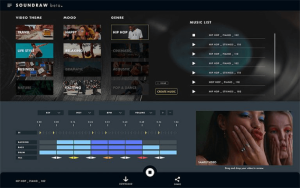
Image by: Yandex.com
AI music generators function by using machine learning and deep learning algorithms. Here’s a brief overview of how the technology behind them works:
- Training the Algorithm: AI music generators learn from a large collection of existing music data. The software is trained to recognize patterns in music such as melody, harmony, rhythm, and even lyrical structure.
- Generating Music: After training, the AI can generate new music by imitating these learned patterns. It can create music that fits within a specified genre or style, using parameters chosen by the user.
- Refine the Output: Some AI tools allow users to refine the generated music by tweaking individual elements. This could include adjusting tempo, changing instruments, or even reworking the melody.
Benefits of Using an AI Music Generator
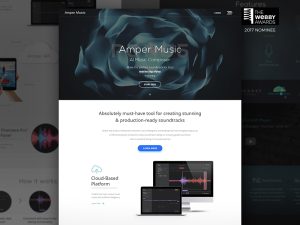
Image by: Yandex.com
AI music generators bring many benefits to musicians and creators. They can save time by quickly producing music, which is usually a long process. These tools also help boost creativity by suggesting new ideas and combinations that people might not think of on their own. Additionally, they make music creation accessible to beginners who may not have formal training in music theory or production. AI music generators offer several advantages, making them a powerful tool for musicians, producers, and content creators.
1. Faster Music Creation
One of the biggest benefits of using AI music generators is the speed at which songs can be created. Traditionally, composing and producing music can take hours or even days. With AI tools, artists can generate a rough version of a song in minutes, providing a strong foundation for further work.
2. Increased Creativity
AI can inspire creativity by offering new and unique ideas. It can generate musical combinations and variations that an artist might not have considered. This can lead to exciting collaborations between human creativity and AI innovation.
3. Accessibility for Beginners
Not all aspiring musicians have the skills or resources to produce complex compositions. AI music generators make it easier for anyone to create music, even without advanced knowledge of music theory or production.
4. Cost-Effective Solution
AI music generators are often more affordable than hiring professional musicians or sound designers, making them a cost-effective solution for businesses, content creators, or independent artists working on a budget.
5. Customization Options
Many AI music generators offer customizable features that allow users to choose genres, instruments, and tempos. This provides flexibility, ensuring that the generated music fits the user’s specific needs.
Key Features to Look for in an AI Music Generator
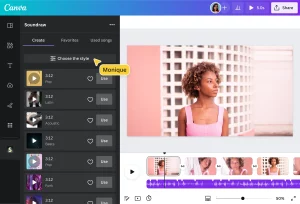
Image by: Yandex.com
When choosing an AI music generator, it’s essential to consider the features that best suit your needs. Below are the top features to look for:
1. Genre Flexibility
A good AI music generator should be able to create music across a variety of genres. Whether you’re into pop, rock, jazz, classical, or ambient music, the tool should provide a wide range of musical styles.
2. Customizability
Look for a tool that allows you to modify key aspects of the music, such as tempo, instruments, and mood. This will ensure the AI-generated music aligns with your vision.
3. Ease of Use
AI music generators should be user-friendly, especially for those who may not have experience with music production. A clean interface and intuitive controls make the process smoother.
4. Royalty-Free Music
For creators who intend to use the music commercially, it’s crucial to choose an AI music generator that offers royalty-free music, allowing you to use the generated tracks without any legal complications.
The Growing Use of AI in the Music Industry
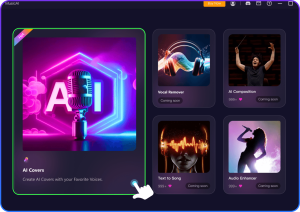
Image by: Yandex.com
The use of AI in the music industry is growing every day. More and more music platforms are integrating AI features, such as recommending songs based on user preferences or creating playlists using AI. Artists and producers are also using AI to generate music for different projects, like video games, movies, or commercials. This widespread use shows just how much AI is becoming a part of the modern music world.
Challenges and Ethical Considerations
Despite the exciting potential of AI music generators, there are a few challenges and ethical concerns to consider:
- Lack of Originality: Since AI music generators learn from existing data, there’s a risk that the generated music may be too similar to other works, raising questions about originality.
- Impact on Employment: As AI takes over some aspects of music creation, there may be concerns about job loss for traditional musicians and producers.
- Copyright Issues: The use of AI-generated music could potentially lead to copyright disputes, particularly when it comes to ownership and rights to the music created.
The Future of AI Music Generators
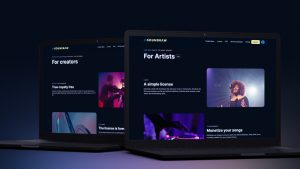
Image by: Yandex.com
The future of AI music generators is bright, with ongoing advancements in machine learning and neural networks. As these tools evolve, they will become even more sophisticated, offering more realistic and innovative compositions. Additionally, AI music generation will continue to democratize music creation, allowing more people to become involved in the music industry, regardless of their skill level.
Some potential future developments include:
- More Personalized Music Creation: AI tools may soon allow users to create music that aligns even more closely with their unique preferences, such as adjusting the emotional tone of a piece.
- Integration with Other Technologies: Expect to see AI music generators integrating with virtual reality (VR) and augmented reality (AR) to create immersive music experiences.
- Collaborative AI and Human Compositions: More platforms may emerge that allow musicians to collaborate with AI, combining their creativity with the power of artificial intelligence.
Popular AI Music Generators in 2024
Several AI music generators have gained popularity in recent years. Below are some of the most well-known options:
| AI Tool | Features | Best For |
|---|---|---|
| OpenAI’s Jukedeck | Generate original songs with AI; multiple genres available. | Independent musicians and content creators |
| Amper Music | Customizable compositions with full tracks; royalty-free. | Film and video producers, advertisers |
| Aiva | AI-driven classical and cinematic music generation. | Film score composers, game developers |
| Soundraw | Create royalty-free music in multiple genres; AI-assisted editing. | YouTubers, podcasts, content creators |
These tools showcase the versatility of AI music generation across different genres and needs.
Comparative Analysis of AI Music Generators
To provide a clearer understanding of the options available, here’s a comparative table of some of the top AI music generators in terms of features, ease of use, and customization.
| AI Music Generator | Features | Ease of Use | Customization | Price |
|---|---|---|---|---|
| OpenAI’s Jukedeck | Multi-genre, easy-to-use | Very Easy | Limited | Subscription |
| Amper Music | Full-length tracks, royalty-free | Moderate | High | Pay-Per-Use |
| Aiva | Classical music, scoring tools | Moderate | High | Subscription |
| Soundraw | Multi-genre, AI-assisted editing | Easy | Moderate | Pay-Per-Use |
Conclusion
AI music generators are rapidly changing the way we approach music creation. By harnessing the power of AI, musicians and creators are able to generate songs in record time, explore new styles, and access professional-quality production tools without the need for expensive equipment. While there are still challenges to overcome, such as concerns about originality and ethical issues, the future of AI in music creation looks promising. As the technology continues to evolve, it will undoubtedly unlock even more exciting possibilities for both artists and listeners.

